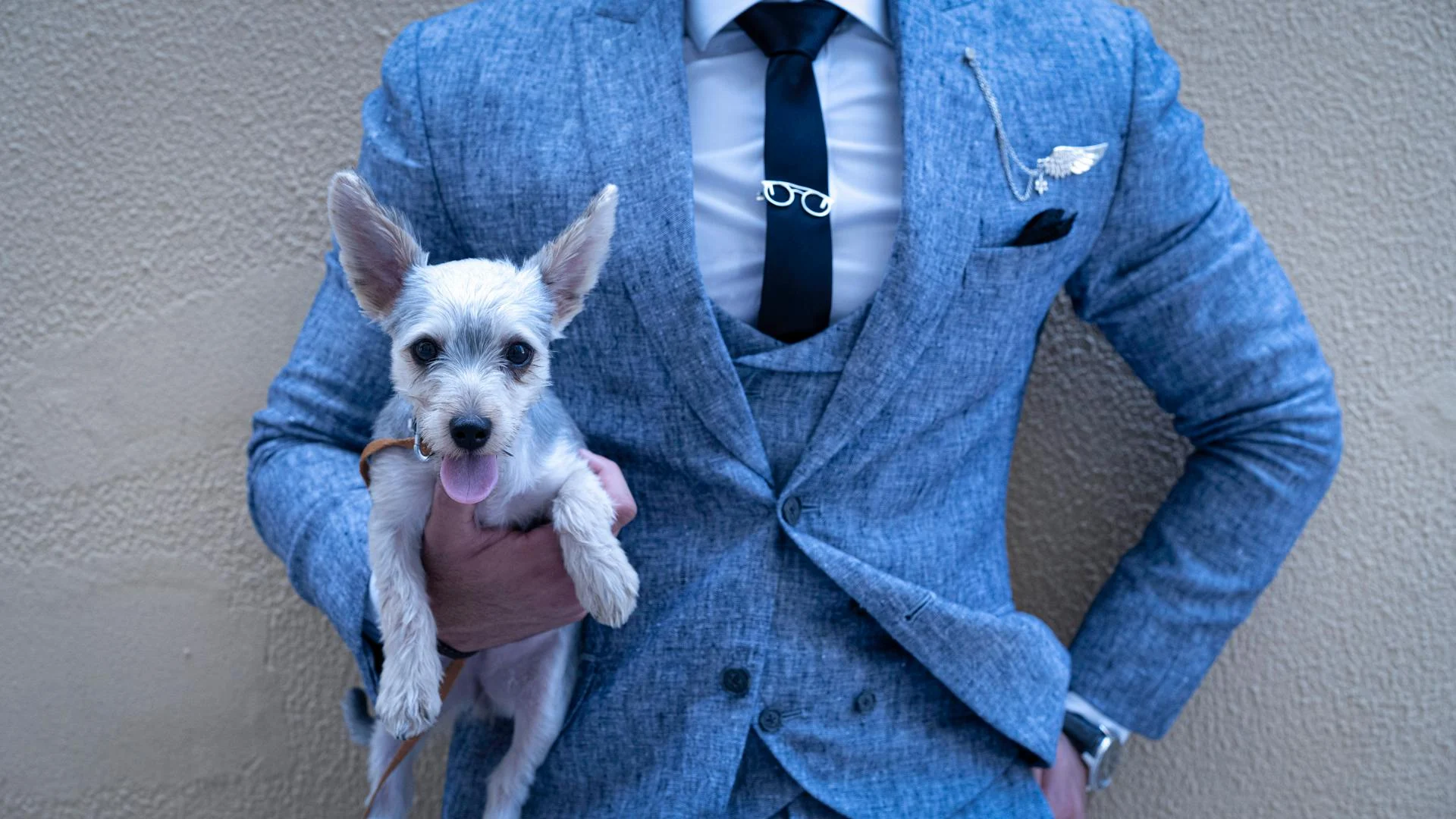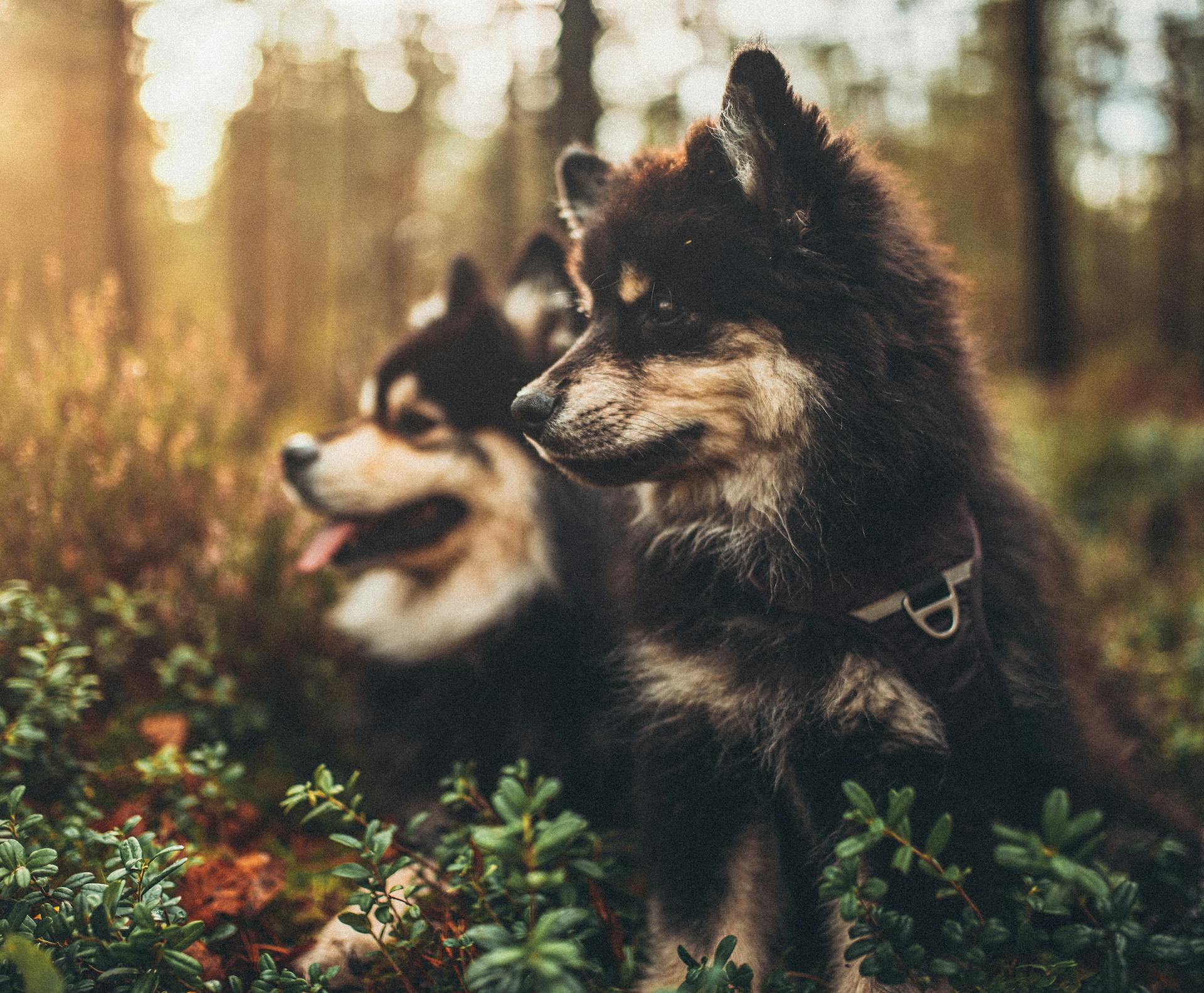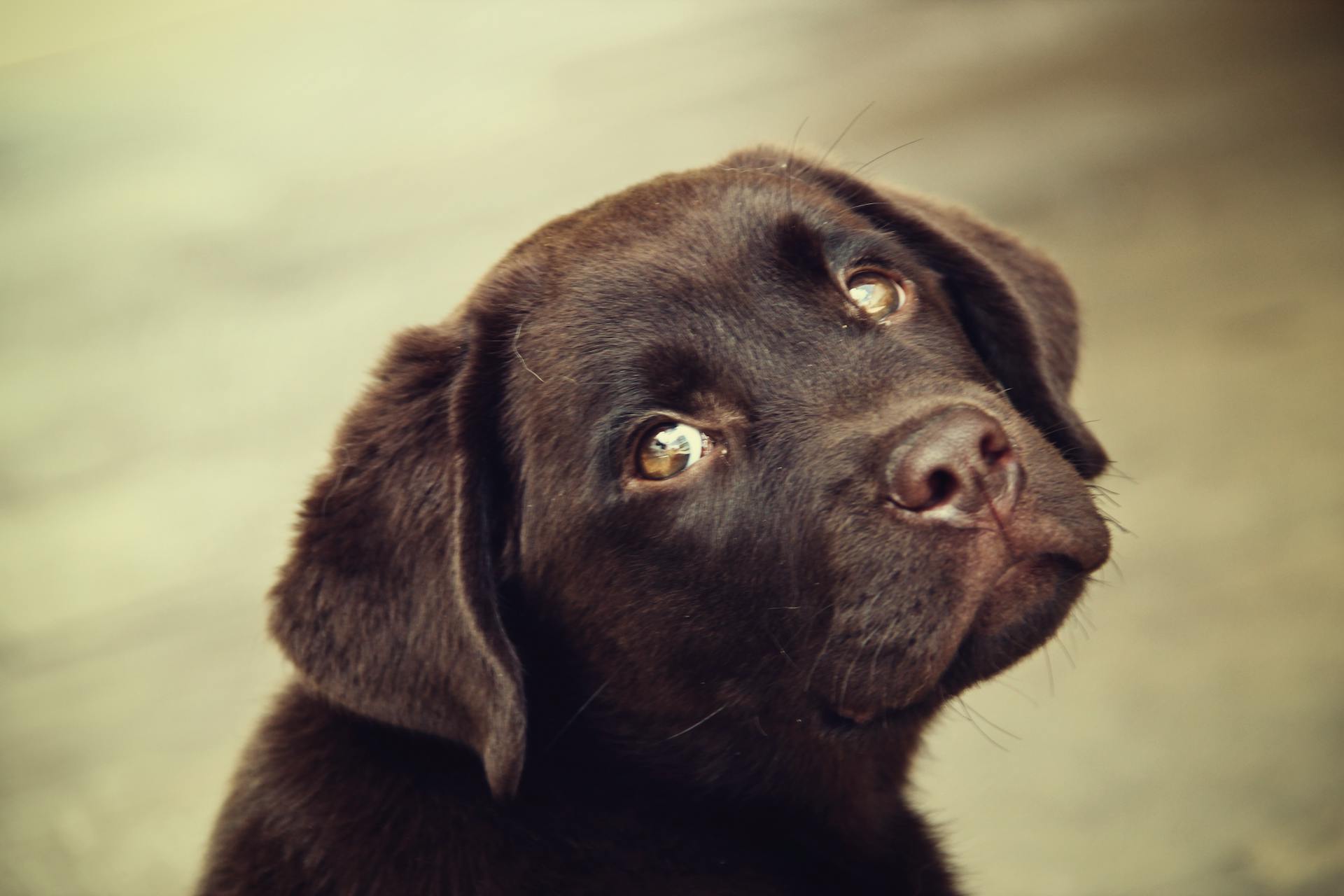
Housetraining a puppy or dog requires patience, consistency, and positive reinforcement.
Establishing a routine is key, as puppies can hold their bladder for one hour per month of age, plus one hour.
You'll need to take your puppy outside frequently, especially after meals and playtime.
Puppies can't control their bladders until they're around 16 to 20 weeks old.
For your interest: How Long Does Toilet Training Take for Puppies
Preparation
Before you start housetraining, make sure you have a plan in place. Scolding a puppy for soiling your rug won't do much, so it's best to focus on positive reinforcement.
To prepare your home, use a cleaner that eliminates odors to remove any lingering scents that might attract your puppy to the same spot again. Blot up liquid on the carpet before cleaning the rug to prevent stains.
Make sure you have a designated potty area outside, and be prepared to take your puppy there frequently, especially after meals and naps.
Understand Normal Behavior
Dogs don't naturally understand that they need to go outside to relieve themselves. It's up to you to teach them.
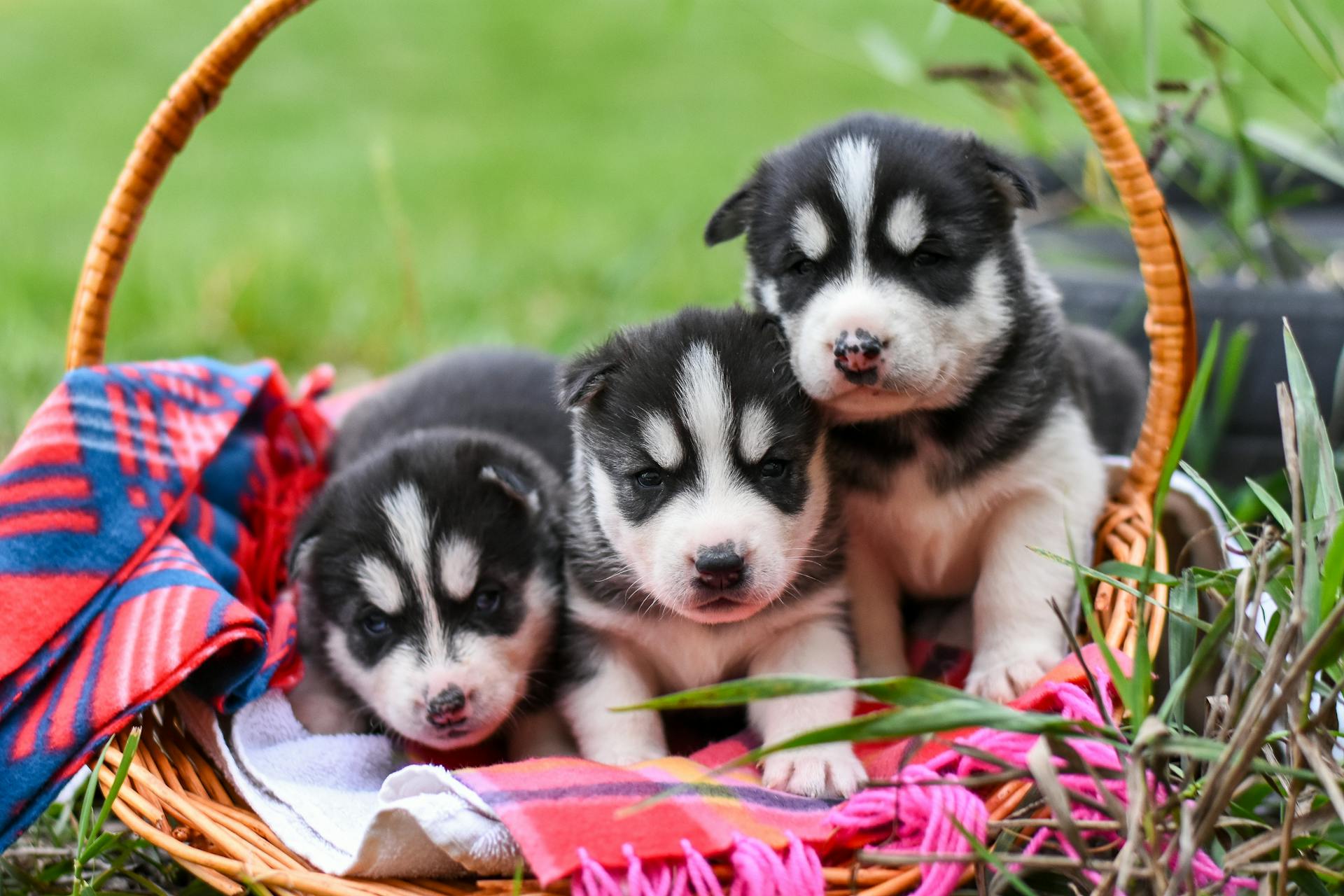
Punishing your dog for accidents can actually make things worse. It can teach them to fear you and hide when they need to go.
You must be patient with your dog, whether you're dealing with a puppy or an adult. They won't automatically understand your household routine or know where the door is.
Get Started
To start house training your puppy, it's essential to begin as soon as you bring them home. This will help establish a routine and make the process easier for both you and your puppy.
Get a book on house training, such as "Way to Go! How to Housetrain a Dog of Any Age" by Karen London and Patricia McConnell, for guidance and tips.
Supervision and Training
Supervision is key to successful housetraining. You must see everything that comes out of the dog so you can interrupt inside "accidents" and reward outside potties.
You should watch for individual signals and rhythms, as canine potty habits are highly idiosyncratic. Some puppies may be able to hold it longer than others, while some will have to go out every time they play or get excited.
Here are some signs that your puppy needs to go out: barking or scratching at the door, squatting, restlessness, sniffing around or circling. If you notice any of these signs, immediately grab the leash and take them outside to their bathroom spot.
A consistent housetraining schedule is critical to success. Puppies have tiny bladders, and water runs right through them. The same is true for solid matter. You have to make sure you're giving your puppy ample opportunity to do the right thing.
A good guide is that dogs can control their bladders for the number of hours corresponding to their age in months up to about nine months to a year.
When to Start
When to start house training is crucial for a smooth transition for both you and your puppy. Begin house training as soon as you bring your puppy home.
It's essential to be patient and not expect immediate results. Puppies may not become consistent until they're between 12 and 16 weeks old.
On a similar theme: Mini Educator E Collar Not Charging
At this age, they've developed enough control of their bladder and bowel movements to learn to hold it. This is a significant milestone in their development.
If your puppy is older than 12 weeks, house training may take longer. You'll have to reshape their behavior with encouragement and rewards.
In some cases, older puppies may have developed habits that need to be corrected, like eating their waste.
Methods for
Supervise your puppy at all times, especially during the housebreaking process. This means keeping an eye on them whenever they're indoors and watching for signs that they need to go out.
A schedule is key to success when house training. Puppies can hold their pee 1 hour for every month of age until they're about a year old. So, if your puppy is 3 months old, they can hold their pee for about 3 hours.
Take your puppy outside often during the day. At the least, experts recommend taking them out: as soon as they wake up, during and after a play session, any time they eat or drink, after a nap, after they've been in their crate, and last thing before bed.
A different take: Do Dog Pee Pads Work
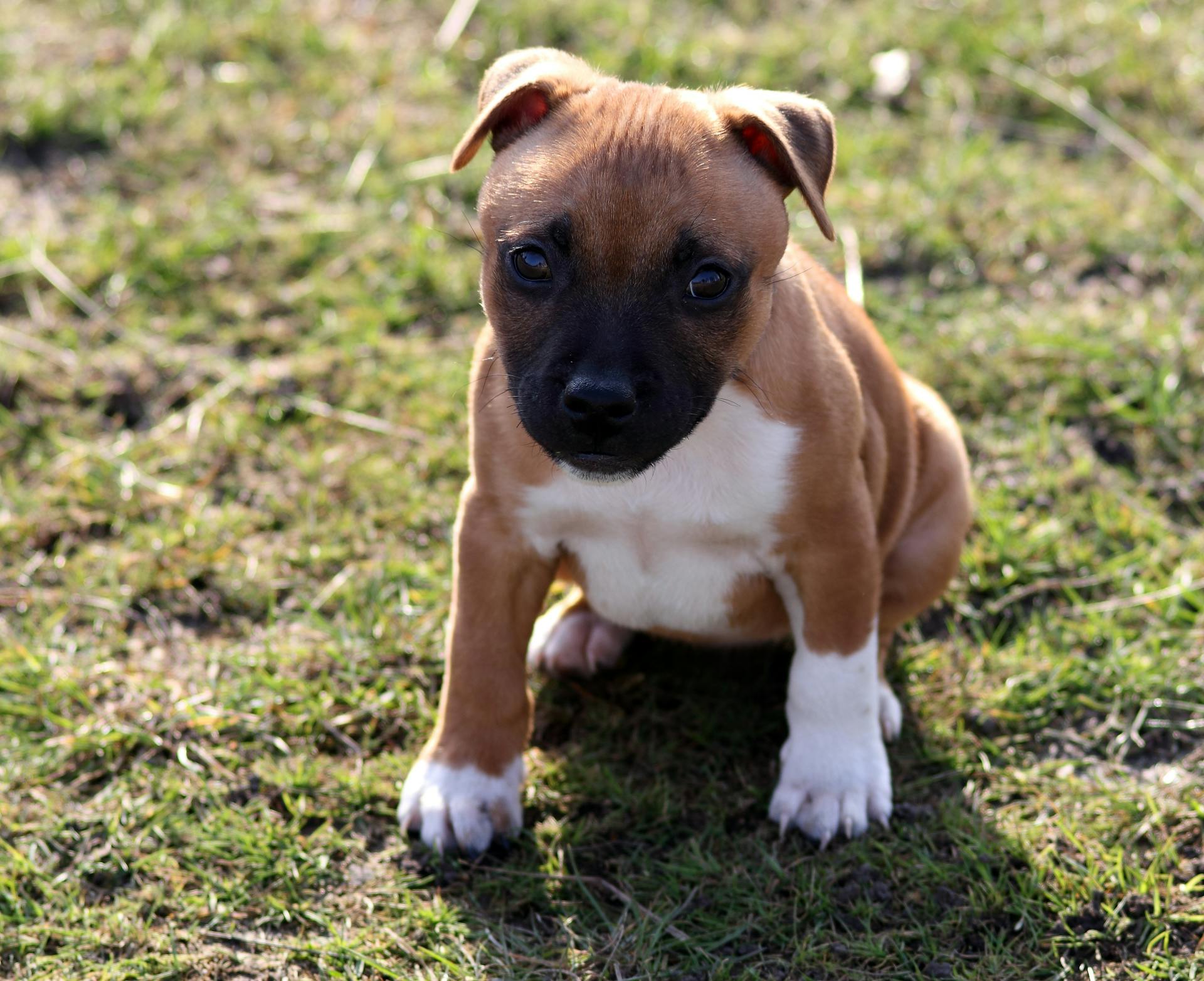
Confine your puppy to a small area when you can't supervise them. This space should be big enough for them to comfortably stand, lie down, and turn around. You can use a portion of a bathroom or laundry room blocked off with baby gates, or crate train your puppy.
Some signs that your puppy needs to go out include sniffing, squatting, circling, or tail out straight. If you notice any of these signs, take your puppy to their bathroom spot immediately.
Here are some common signs that your puppy needs to go outside:
- Sniffing
- Squatting
- Circling
- Tail out straight
If your puppy begins to poop or pee inside, take them outside to the area where you want them to go as soon as possible.
Troubleshooting
Troubleshooting common housetraining problems can be a challenge, but don't worry, we've got you covered. Accidents will happen, and it's essential to know how to handle them.
If your dog has a medical issue, it may be causing them to have accidents inside the crate. Take them to the vet to rule out any underlying health problems.
Sometimes, house soiling can be a sign of a physical issue, and a vet workup is necessary to determine the cause. Dr. Burch recommends a good veterinary workup before the several-month mark if your dog is having trouble housetraining.
If your dog keeps peeing in the same spot where they had an accident, it's likely because the area still smells like urine. Clean up the mess efficiently using pet stain enzymatic cleaners to avoid any lingering odors.
To minimize accidents, supervise your puppy closely and use confinement procedures like crate training. If your puppy does have an accident, don't punish them, as this can create more problems.
Here are some common complaints that trainers have encountered:
- My dog keeps peeing in the same spot where they had an accident.
- They're soiling their crate!
- Accidents are common with puppies up to a year old.
- Mistakes happen.
Accidents can be caused by a range of factors, including incomplete house training, changes in environment, or physical problems. If your dog is still having trouble after consistent housetraining for a couple of months, it's possible they have a physical issue that needs to be addressed.
If you've tried everything and your dog is still having accidents, it may be time to consult a trainer or dog behaviorist who has experience with house training.
You might enjoy: Indoor Dog House Training
Crates and Potty Tools
Dogs are naturally clean creatures and don't like to mess in their living spaces. They'll often let you know when they need to go by whining and scratching, so be prepared to take action quickly.
Dogs are den animals and will seek out a cozy spot to feel secure, which makes it easy to train them to love their crate. A crate should be the right size for your dog, just large enough for them to lie down, stand up, and turn around.
Using a plastic airline crate is a great idea for housetraining, as they're easy to clean and can be taken outside for a quick spray-down when needed.
Recommended read: Robs Dogs Dog Training
Crates as Potty Tool
Using a crate is a great way to housetrain your dog. The crate should be the right size for your dog, allowing them to comfortably stand up, turn around, and lie down.
Dogs are clean creatures and don't like to eliminate where they sleep. If your dog has accidents in the crate, it's essential to determine if they were kept in a cage for long periods, making housetraining more difficult.
You might enjoy: Is Crate Training Cruel
If your dog has medical issues, take them to the vet to rule out any underlying problems. If medical issues are ruled out, consult a trainer or behaviorist for advice.
You can adjust the size of the crate as your puppy grows, using partitions if necessary. A good rule of thumb is to make sure the crate is just large enough for your dog to lie down, stand up, and turn around.
If your dog whines and scratches to be let out, it's likely they need to go to the bathroom. Don't let them have accidents in the crate, as they'll think it's okay to mess up their living space.
Here are some crate options to consider:
- Plastic airline crates are easy to clean and can be taken outside and sprayed out when needed.
- Wire crates can be problematic, as they don't contain dog hair and may not be as easy to clean.
Pad and Paper Usage
Using puppy pads and paper training can be a bit tricky, as it reinforces two different options for the puppy. In an ideal situation, puppies would learn to hold it indoors and only eliminate at specific spots outdoors.
Puppy pads give a dog the option of relieving themselves in an approved spot at home, which can be a lifesaver for people with jobs that make it impossible to get home several times a day. This option can also work well for tiny dogs living in areas with brutal winters.
There are also indoor dog bathrooms that even work for male dogs, providing a convenient solution for pet owners who need it.
For more insights, see: Shock Collar for Dogs Chasing Cars
Odor Neutralizer and Indoor Spray Repellent
Using an odor neutralizer and indoor spray repellent is a crucial step in eliminating the incentive for your dog to pee in the same spot again.
You can find odor neutralizers in pet stores, but make sure to avoid using household cleaners as they contain ammonia and will attract your dog back to the same spot.
Odor neutralizers will completely eliminate the scent, which is only discernible by your dog, by neutralizing the smell.
For your interest: Spot Target Dog
After neutralizing the area, use an indoor pet spray repellent to deter your dog from using the same spot again.
This two-step process will help eliminate the odor and the incentive for your dog to pee in the same spot, making it easier to train your dog to use the crate and potty area.
Outdoor and Travel
Praising your puppy for doing their business outside is key to successful housetraining. Be effusive in your praise, cheer, clap, throw cookies, and let them know that no other accomplishment has been as important as this pee.
If you catch your dog starting to squat to urinate or defecate, pick them up and immediately rush outside. If they do the job outdoors, give them plenty of praise and attention.
Preventing accidents is crucial, so make sure to arrange for someone to take your puppy for bathroom breaks if you're away for long periods. Alternatively, you can train them to eliminate in a specific place indoors, but be aware that this can prolong the process.
If you do have an accident, don't make a fuss, just clean up the mess with a cleaner that eliminates odors to remove the scent, so the dog won't use it in the future. Blot up liquid on the carpet before cleaning the rug.
If you have to be away from home for more than four or five hours a day, consider an older potty trained dog who can wait for your return. If this isn't an option, make sure to provide a designated elimination area for your puppy, such as a sod box or pet pee pads, and confine them to this area when you're away.
Preparing for Outdoor Activities
If you're planning a trip or outdoor adventure with your furry friend, it's essential to prepare them for the experience. Scolding a puppy for soiling your rug isn't going to do much, so it's best to praise them for doing the right thing.
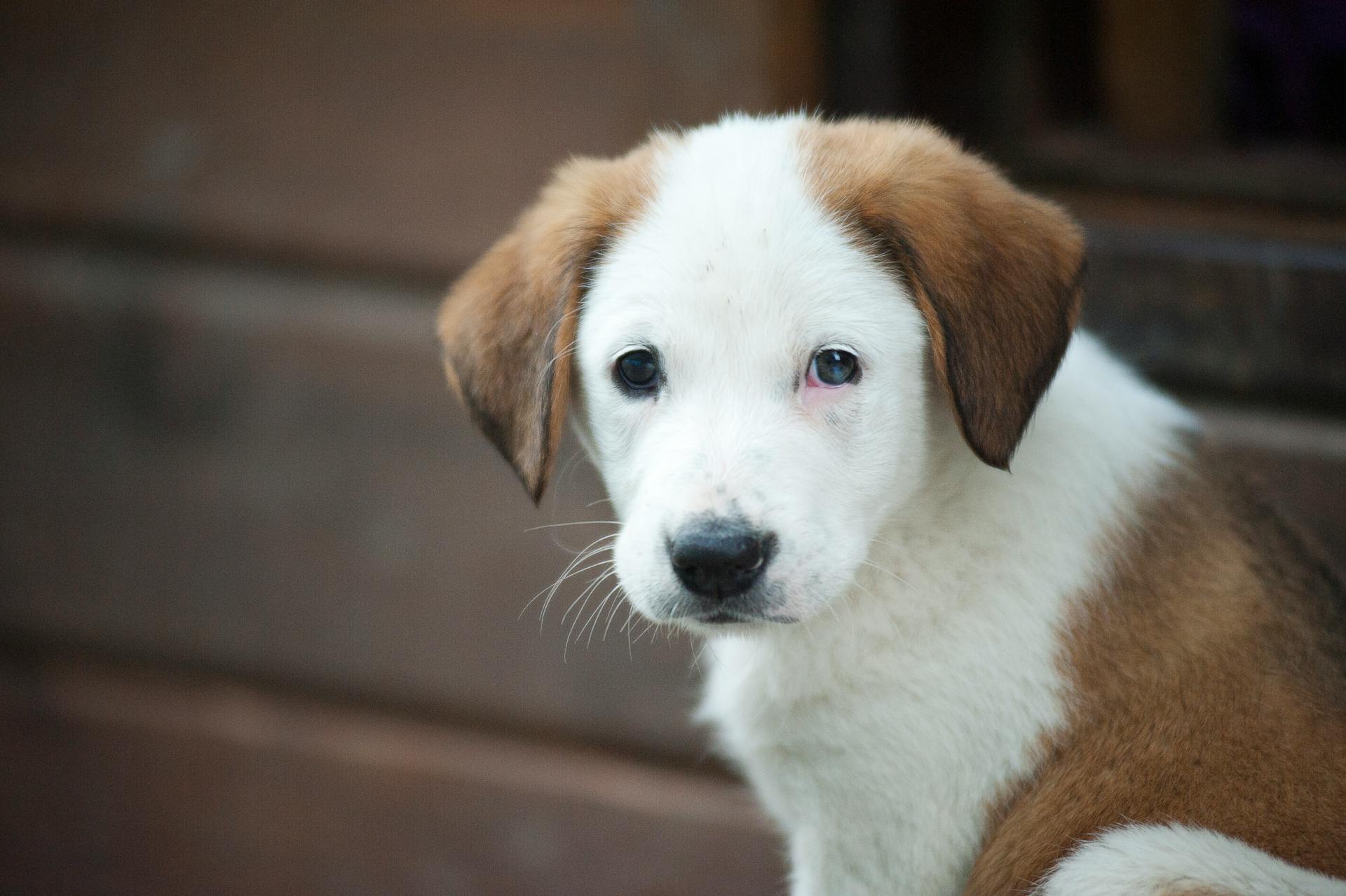
Make sure your puppy is well-housetrained before heading outdoors. Praising a puppy for doing the right thing works best for everything you will do in your life together. Give them plenty of praise and attention when they do their business outside.
Remember to bring plenty of treats and snacks for your puppy during outdoor activities. Reward your puppy with one of their favorite treats, nice and small, easy for your puppy to digest. If your dog has an accident, clean up the mess and remove the scent with a cleaner that eliminates odors.
For more insights, see: Peanut Butter Dog Training Treats
Travel Planning
Travel Planning is crucial to ensure a smooth trip for both you and your furry friend. If you have to be away from home for more than four or five hours a day, it may not be the best time to get a new puppy.
You may want to consider an older potty-trained dog who can wait for your return. If you already have a puppy and must be away for long periods of time, you'll need to make arrangements for their care.
Here are some options:
- Arrange for someone, such as a responsible neighbor or a professional pet sitter, to take them for bathroom breaks.
- Train them to eliminate in a specific place indoors, like a designated area with enough room for a sleeping space, a playing space, and a separate place to eliminate.
- Use pet pee pads, newspapers, or a sod box in the designated elimination area.
Remember, if you have to clean up an accident outside the designated elimination area, put the soiled rags or paper towels inside that area afterward to help your puppy recognize the scented area as the place where they are supposed to eliminate.
Correction and Prevention
If your puppy starts having accidents in the house again, it's not a lost cause. Training regression happens when a pup you thought was house trained starts having accidents inside again, often due to waiting too long for potty breaks or not paying attention to the signs they need to go.
To correct the issue, put your puppy back on their regular schedule and supervise them while they're inside. This will help them get back on track with their house training.
If your vet says your puppy is okay, but they seem to have forgotten their house training, build their confidence by playing with them and giving them a chance to work off stress and anxiety. This should help them get back on track.
Here are some dos and don'ts to keep in mind while correcting and preventing accidents:
- Don't punish your puppy for having an accident. It's already too late to correct their behavior.
- Get their attention without scaring them if you catch them in the act. Clap or make another kind of noise to let them know they've done something you don't like.
- Clean up accidents with an enzyme cleaner rather than an ammonia-based cleaner to minimize odors that might attract the puppy back to the same spot.
Proper Correction
Punishing your puppy for having an accident is a big no-no. It's already too late to correct their behavior if you catch them in the act.
If you do catch your puppy in the act, get their attention without scaring them. You can clap or make another kind of noise to signal that they've done something you don't like.
Then, take them outside by calling them or taking them gently by the collar. When they're finished going in the right spot, praise and reward them.
If you found the evidence but didn't see the act, don't react angrily by yelling or rubbing their nose in it. Puppies and dogs aren't intellectually capable of connecting your anger with their accident.
Here are some key takeaways for proper correction:
- Get your puppy's attention without scaring them.
- Take them outside immediately.
- Praise and reward them when they go in the right spot.
- Don't react angrily if you found the evidence but didn't see the act.
Regression
Regression is a common issue that can set back your puppy's house training progress. It's normal for puppies to have accidents, but training regression happens when a pup you thought was house trained starts having accidents inside again.
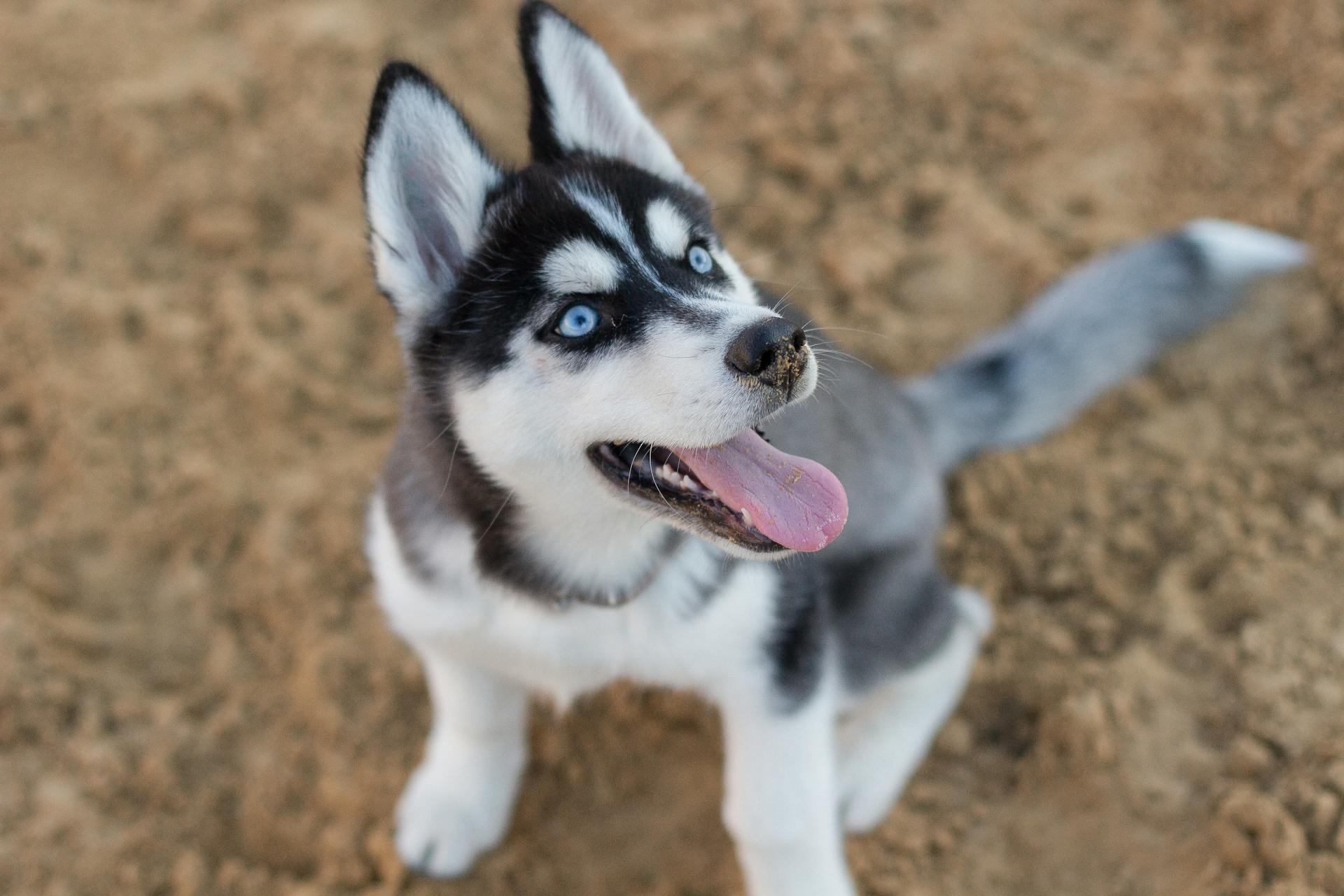
Waiting too long to take them out for potty breaks can cause regression. This is because puppies have small bladders and can't hold their urine for long periods.
You may not be paying attention to the signs that they need to go, which can also lead to regression. Puppies will often sniff and circle before they go, so make sure to watch for these cues.
Emotional problems, such as stress and anxiety from a change in their environment, can also cause regression. This is because puppies are highly sensitive to their surroundings and can pick up on your emotions.
If your vet says your puppy is okay, but they seem to have forgotten their house training, put them back on their regular schedule and supervise them while they're inside. This will help them get back on track.
Some common underlying health issues that can cause regression include sickness, infections, and canine cognitive decline. If you suspect any of these issues, consult with your vet for proper diagnosis and treatment.
Building your dog's confidence by playing with them and giving them a chance to work off stress and anxiety can help prevent regression. Regular exercise and playtime can also help strengthen your bond with your puppy.
Frequently Asked Questions
What does it mean when a dog is house trained?
A dog that's house trained can stay indoors for several hours without having an accident, holding their bladder until they're taken outside to relieve themselves. This means you can trust your dog to be clean and respectful of your home.
Sources
- https://www.americanhumane.org/fact-sheet/housetraining-puppies-dogs/
- https://www.akc.org/expert-advice/training/how-to-potty-train-a-puppy/
- https://www.humanesociety.org/resources/how-potty-train-your-dog-or-puppy
- https://leerburg.com/housebrk.htm
- https://www.webmd.com/pets/dogs/house-training-your-puppy
Featured Images: pexels.com
